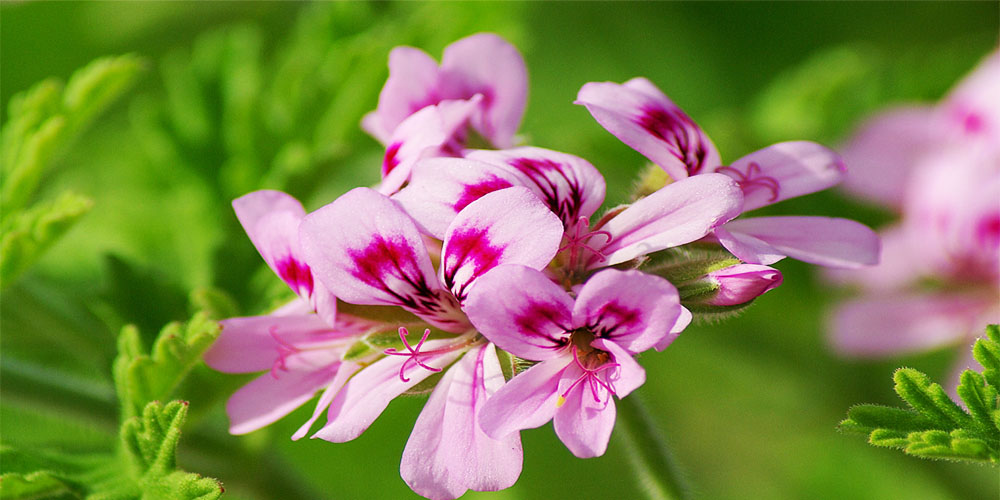We do shipping of our products WORLDWIDE.
ALL OUR PRODUCTS ARE PACKED BY VISUALLY HANDICAPPED
100% NATURAL PLANT SCENT ESSENTIAL OILS

Rose geranium is a type of geranium with leaves that have a strong scent of roses. This type of geranium is native to certain parts of Africa.
Also known as rose geranium, sweet-scented geranium, or old-fashioned rose geranium. The plant has velvety gorgeous leaves and flowers and blooms pale pink or almost white.
Some people use rose geranium essential oils in a variety of treatments and home remedies. Read on to find out what we know about the properties of rose geranium essential oils for healing and home use.
Some claims about rose geranium essential oil are well-researched and proven, while others aren’t as well-documented. The claimed benefits of the rose geranium essential oil include:
Rose geranium oil is the active ingredient in some cosmetics, such as lotions and fragrances.
A 2017 study review showed that the antioxidant properties of rose geranium oil might help reduce the signs of aging.
Antioxidants have been established as a natural active ingredient to improve the skin’s self-healing ability from environmental toxins and pollution.
The anti-inflammatory effect of rose geranium oil has been proven in animal experiments.
In fact, a 2013 study from a reliable source showed that rose geranium oil has a powerful effect on reducing swelling in the feet and ears of mice.
It has been suggested that rose geranium oil may be the basis for new anti-inflammatory drugs that may have fewer harmful side effects than current drugs.
Rose geranium oil has strong antibacterial, antifungal, and antiviral properties.
Gastronomy uses rose geranium oil as a natural preservative for some foods.
A 2017 study review showed that rose geranium reduces the bacteria, fungi, and viruses that cause skin diseases and infections.
The rose scent from rose petals has been studied and demonstrated by reliable sources to improve relaxation, relieve pain and relieve anxiety in the clinical environment.
It is unknown whether it is the scent itself, the memory of the scent, or the chemicals contained in the scent that cause this chemical reaction in the brain.
Anecdotally, rose geranium smells like roses, so some believe it has the same effect when inhaling essential oils.
Rose geranium oil is found in many cosmetics, including soaps, fragrances, lotions and anti-aging cosmetics.
Some weight loss and bodybuilding supplements contain rose geranium oil as an “active ingredient”. Rose geranium oil may help regulate blood sugar levels, but no studies suggest that it can help you lose weight or build muscle.
Rose Geranium Essential Oil contains ingredients that can be effective mites repellents. In a 2013 study of 10 essential geranium oils from reliable sources, each oil showed a certain protective effect against ticks, especially nymphs and young ticks.
Essential oils are very strong and need to be diluted before being applied to the skin. Those scents can also diffuse into the air.
Diluted Rose Geranium Essential Oil can be applied to the skin as an astringent that tightens, brightens and removes dead skin cells.
It can also be used as a sedative and antibacterial topical agent for the treatment of bacterial acne.
We can use rose geranium essential oil through inhalation, diffuser and added to the hot bath, or mixed with a carrier oil and applied topically.
To use rose geranium oil, first, dilute it with a carrier oil such as jojoba oil or coconut oil.
Before applying to the face, do a patch test with diluted oil on a small, unobtrusive part of the arm and wait 24 hours to make sure you are not allergic to rose geranium oil.
For people who aren’t allergic to rose geranium oil, it’s typically safe to be used topically, inhaled, or in a diffuser. Essential oils are not meant to be swallowed, as many are toxic.
Never use rose geranium oil as a replacement for a medical prescription that a doctor has given to you.
If you would like to use rose geranium essential oil to treat acne and inflammation, consider grape seed oil and tea tree oil.
Rose Geranium Oil is a powerful antibacterial and antioxidant essential oil. Other essential oils with similar antioxidant properties are rosemary oil, lemon oil, and carrot seed oil.
Rose geranium has been used for centuries to treat skin conditions, regulate blood sugar levels, and aid digestion. However, most of the rose geranium essential oils claims need further investigation.
Rose geranium essential oil is safe to use for the majority and can be used as an antibacterial, antibacterial, and anti-aging agent for the face and skin. The gentle scent of roses also helps to calm down and relax.
Recent Comments